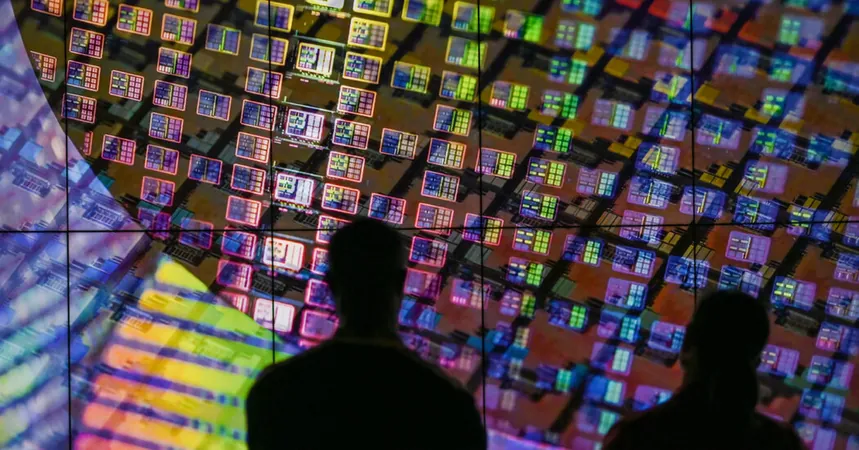
OpenAI’s Bold Move to Revolutionize A.I. Infrastructure: Will It Really Change the Game?
2024-09-25
Author: Ting
Introduction
In a visionary push to reshape the future of artificial intelligence (A.I.), Sam Altman, the CEO of OpenAI, has unveiled an ambitious plan aimed at creating the global computing power necessary for developing advanced A.I. technologies. This proposal involves a multitrillion-dollar collaboration among investors, chip manufacturers, and governments to construct a vast network of computer chip factories and data centers globally, extending even into the Middle East.
Scope of the Initiative
Altman's initiative, which was first floated to investors in the UAE, has sparked ongoing discussions with various stakeholders across Asia, Europe, and North America. The goal is to establish a broad array of data centers, which would serve as a powerful reservoir for computing resources, significantly enhancing the capabilities of A.I. systems. The plan illustrates the tech industry's commitment to rapidly advancing a technology that many believe could be as revolutionary as the Industrial Revolution itself.
Skepticism and Revised Expectations
Despite the grand scale of Altman's vision, some found it laughable when news broke that he was seeking investments of up to $3 trillion—approximately a quarter of the annual U.S. economy. U.S. officials raised concerns about the prospect of a domestic tech firm building critical infrastructure in the Middle East, highlighting the need for regulatory approvals for such cross-border investments.
New Strategy
In response to skepticism, Altman has since moderated his expectations, aiming for a target of hundreds of billions instead. His new strategy includes courting U.S. government support by prioritizing the establishment of data centers within America before seeking international investments. However, the specifics surrounding funding, project management, and construction remain ambiguous.
Financial Challenges
Presently, OpenAI faces significant financial challenges, with expenditures nearing $7 billion annually against revenues of approximately $3 billion. With this substantial deficit, the need for partnerships and investments is more pressing than ever.
Vision for Data Centers
In private discussions, Altman has likened the increasing accessibility of data centers to the historical expansion of electrical power. He envisions a future where data flows similarly, enabling AI technologies to evolve and expand dramatically. However, the current shortage of chips and data centers hinders this vision, compelling OpenAI to advocate for global increases in computing capacity.
Role of UAE in Chip Manufacturing
The initial proposal suggested the UAE could take the lead in funding multiple chip manufacturing facilities, potentially reducing overall production costs for critical players like Taiwan Semiconductor Manufacturing Company (TSMC). TSMC is instrumental in producing chips for NVIDIA, a major A.I. chip developer whose innovations power platforms like OpenAI's ChatGPT.
National Security Concerns
While negotiations with the Emirates include partnerships with major firms like TSMC and Samsung, national security fears have complicated matters. U.S. officials worry that collaborating with the UAE could inadvertently provide China access to vital technologies, owing to existing ties between Emirati and Chinese universities, some with military connections.
Ongoing Discussions and Global Energy Solutions
Conversations are still active among the UAE, U.S. regulators, and various chip manufacturers. OpenAI has expanded inquiries internationally, including proposals to leverage nuclear energy in Japan and renewable wind energy in Germany to power new data centers.
Advocacy for Domestic Data Centers
In a recent meeting with U.S. tech leaders at the White House, Altman presented a study titled "Infrastructure Is Destiny," advocating for new domestic data centers. He suggested the cost per center could reach $100 billion, designed to house two million A.I. chips, echoing historical infrastructure projects critical for economic revitalization and job creation.
The Global Race for A.I.
With these ambitions, Altman warns that if the U.S. does not collaborate with global partners, particularly the Emirates, it risks being outpaced by China in the A.I. race. As OpenAI's plans develop, the world watches closely—could this be the beginning of a new era for artificial intelligence and technology development? Whether Altman's bold vision materializes will likely determine the course of A.I. infrastructure for years to come.




 Brasil (PT)
Brasil (PT)
 Canada (EN)
Canada (EN)
 Chile (ES)
Chile (ES)
 Česko (CS)
Česko (CS)
 대한민국 (KO)
대한민국 (KO)
 España (ES)
España (ES)
 France (FR)
France (FR)
 Hong Kong (EN)
Hong Kong (EN)
 Italia (IT)
Italia (IT)
 日本 (JA)
日本 (JA)
 Magyarország (HU)
Magyarország (HU)
 Norge (NO)
Norge (NO)
 Polska (PL)
Polska (PL)
 Schweiz (DE)
Schweiz (DE)
 Singapore (EN)
Singapore (EN)
 Sverige (SV)
Sverige (SV)
 Suomi (FI)
Suomi (FI)
 Türkiye (TR)
Türkiye (TR)
 الإمارات العربية المتحدة (AR)
الإمارات العربية المتحدة (AR)